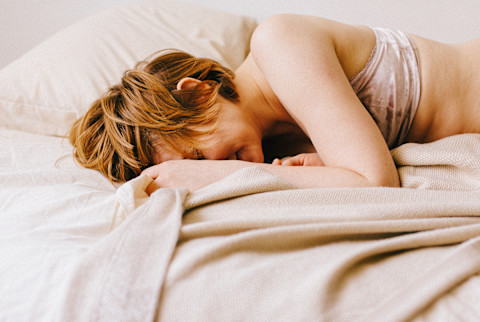Menopause Relief Strategy No One’s Talking About (But Should Be)

When we think of menopause symptom relief, the usual suspects come to mind: hormone therapy, supplements, exercise, and maybe a mindfulness practice or two. But a new study is shining a light on a simple, free, and surprisingly effective tool that’s rarely discussed in the exam room—self-pleasure.
According to the research, published in the journal Menopause, women who regularly masturbated during perimenopause reported meaningful relief from common symptoms like mood swings, sleep disturbances, vaginal dryness, and hot flashes. Yet despite its potential, only about one in 10 women say they’ve ever used masturbation as a menopause management strategy, and even fewer have heard about it from their doctors.
For many women, menopause brings an exhausting cycle of trial and error in search of symptom relief. So when something as accessible as self-pleasure shows comparable benefits to hormone therapy, it deserves a closer look.
How researchers measured the effects of self-pleasure
The Kinsey Institute researchers surveyed ~1,200 women between 40 and 65 across the U.S. about their menopause experiences and how they manage symptoms like sleep issues, mood changes, and hot flashes.
Participants were asked about a range of strategies, from lifestyle changes (exercise, relaxation, and diet) to supplements, hormone therapy, and sexual self-care. While 25% of women exercised and 21% adjusted their diet, only 14% used masturbation as part of their symptom management plan.
Despite being one of the least-used methods, masturbation scored among the highest for symptom relief, earning an average effectiveness rating of 4.35 out of 5, compared to 4.2 for hormone therapy and below 4.0 for lifestyle changes. Nearly half of perimenopausal women said self-pleasure improved at least one symptom, particularly mood and sleep.
The mind-body connection behind pleasure & relief
Orgasms trigger the release of endorphins and oxytocin, both of which ease pain and promote relaxation. This neurochemical cocktail can support better sleep, lower stress levels1, and improved mood stability, three key areas that tend to take a hit during the menopause transition.
There’s also a physiological benefit. Arousal increases blood flow to the vaginal tissue, which can help maintain elasticity and lubrication2, issues many women struggle with as estrogen levels decline. Together, these neurochemical and physiological effects create a powerful support system for the menopausal brain and body.
And it’s not just about symptom relief. Regular self-pleasure can help women stay connected to their bodies during a time when many feel disconnected from their sense of self and sexuality.
Doctors aren’t talking about it (& why they should)
Perhaps the most revealing finding wasn’t about biology at all; it was about communication. Only 7% of women said their doctor had ever mentioned masturbation as part of menopause care. Even when menopause itself was discussed, pleasure and sexual wellness were largely left out of the conversation.
That gap reflects a larger issue in women’s health care: the persistent taboo around talking about female pleasure. Despite the fact that menopause affects every woman, the topic is still under-taught in medical training and under-discussed in clinical settings.
Encouragingly, the researchers found a generational shift. Perimenopausal women were significantly more open to trying masturbation for relief than older postmenopausal participants, and two-thirds said they’d consider doing it more often if they knew it could help.
Editor-approved tools to support pleasure, sleep, & well-being
If you’re curious about exploring this side of menopause relief, choosing the right device can make a big difference. A well-designed vibrator doesn’t just enhance pleasure; it can also support circulation, relaxation, and even better sleep3. Here are a few thoughtful picks designed with women’s health in mind:
- Low libido? This is a game-changer for sexual well-being
- Women say this toy makes sex fun again
- The key to finding the perfect position for pleasurable sex
- The ultimate pleasure companion on the go
The takeaway
Menopause management isn’t one-size-fits-all. Hormone therapy, nutrition, exercise, and supplements each have their place, and so does self-pleasure. It’s not about replacing medical care but about broadening the conversation around what holistic, evidence-based menopause support can look like.
For women navigating this transition, it’s empowering to know that one of the most effective tools for relief might also be one of the most natural and entirely within your control.
